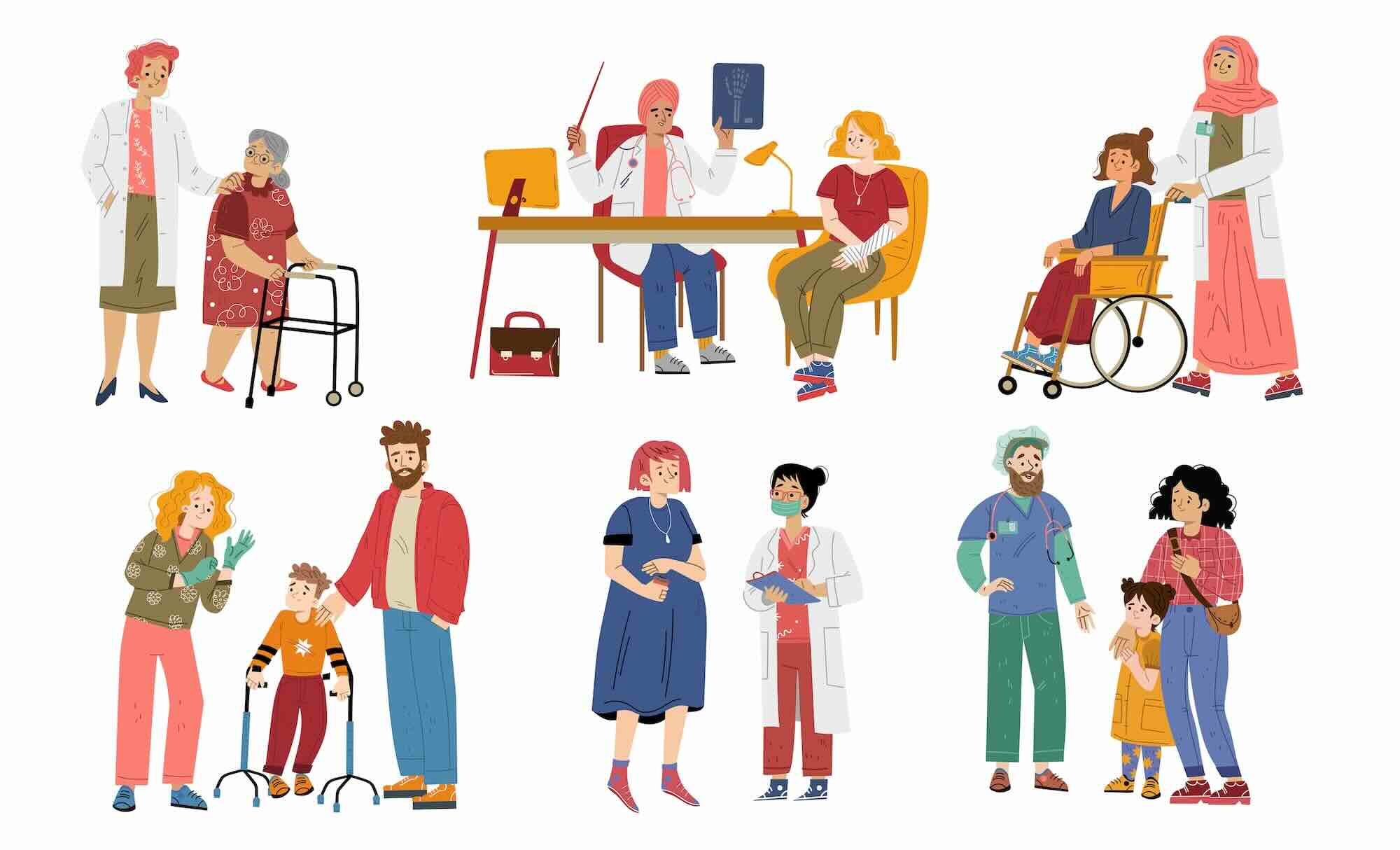Everything You Need to Know About Medical Social Worker Duties and Responsibilities
(Summary Section) Job Aid for Social Worker Medical Field
Medical social work is a specialized field that addresses the intersection of healthcare and social issues. Medical social workers operate in healthcare settings like hospitals, clinics, and hospices to support individuals and families dealing with medical challenges. Their primary goal is to enhance overall patient well-being by addressing social, emotional, and practical healthcare aspects. They work closely with healthcare teams to ensure holistic patient care.
Key aspects of medical social work include patient advocacy, psychosocial assessment, crisis intervention, discharge planning, referrals, and resource coordination, communication and education, advance care planning, support for vulnerable populations, handling ethical and legal issues, bereavement support, and team collaboration. They stay current with healthcare developments to provide the best support.
 Goal & Meaning of Medical Social Work
Goal & Meaning of Medical Social Work
There are various types of medical social workers, each specializing in different areas to meet diverse patient needs. They provide services such as counseling, case management, patient advocacy, community resource referrals, end-of-life care, health education, and support for vulnerable populations.
To become a medical social worker, you typically need a bachelor’s degree in social work, followed by a master’s degree. State licensure is essential, and optional certifications like Certified Medical Social Worker (CMSW) can enhance qualifications.
In terms of salary, compensation for medical social workers can vary based on factors like location, education, experience, and the healthcare setting. Certified and clinical medical social workers often earn higher salaries due to their specialized training. The average salary for a Medical Social Worker (MSW) in the United States is around $70,786 as of October 2023.


See Also: Best Disability Social Work | Top Guide for Disability Social Workers
|
DETAILED SECTION |
|
If you’re ready to further explore social worker medical field, proceed to our detailed sections below that provide a detailed overview. |
Table of Contents: 2024 Social Worker Medical Field Job Aid
Keep on scrolling down this page to read each section or click any link below to go directly to that section.
- What is Medical Social Work? | Meaning of Medical Social Work
- Medical Social Worker Description |What’s the Medical Social Worker Meaning?
- Key Aspects of Medical Social Work
- Role of Medical Social Worker | What Does a Medical Social Worker Do?
- Types of Social Worker in Medical Field
- Most Common Medical Social Services
- What You Need to Know About Medical Setting in Social Work
- Becoming a Medical Social Worker | Requirements for Medical Social Worker
- Medical Social Worker Jobs: Making a Difference in Healthcare
- Salary in Social Work Medical Field
- Conclusion | Social Worker Medical Field Job Aid
- FAQ | Roles of a Medical Social Worker

Don’t Miss: Best Geriatric & Gerontological Social Work | Job Aid for Social Workers
What is Medical Social Work? | Meaning of Medical Social Work
Medical social work is a specialized field of social work that focuses on the intersection of healthcare and social issues.
One of the main roles of a medical social worker is to provide support and assistance to individuals and families dealing with medical challenges.
Social worker in medical social field is a trained professionals who works in healthcare settings, such as:
- hospitals,
- clinics,
- rehabilitation centers, and
- hospices
Goal and Meaning of Medical Social Work
The primary goal of medical social work is to enhance the overall well-being of patients by addressing the social, emotional, and practical aspects of their healthcare. Medical social workers often collaborate with healthcare teams, including doctors, nurses, and other allied health professionals, to ensure a holistic approach to patient care.
With the goal and meaning of medical social work covered, let’s get a better understanding of key aspects of medical social work.


Do you know of any role of medical social worker SlideShare you’d like to share with our readers? If so, contact the Social Work Portal Team.
Medical Social Worker Description | What’s the Medical Social Worker Meaning?
A medical social worker, as described by their medical social worker description and medical social worker meaning, is a crucial healthcare professional who plays an essential role in addressing the psychosocial and environmental factors impacting patients’ well-being. The medical social worker meaning encompasses a multifaceted role that involves medical social worker description tasks like assessment, counseling, and advocacy.
 What Does a Medical Social Worker Do?
What Does a Medical Social Worker Do?
Overall, the medical social worker meaning underscores their invaluable contributions in healthcare settings, where they work as part of an interdisciplinary healthcare team to ensure that patients receive comprehensive care that extends beyond just medical treatment.
Key Aspects of Medical Social Work | Concept of Medical Social Work
Medical social work is a specialized field of social work that focuses on the intersection of healthcare and social services. Medical social workers play a crucial role in helping patients and their families navigate the complex healthcare system and address the psychosocial factors that can impact a patient’s well-being.
Below we have outlined some of the key aspects of medical social work:
Patient Advocacy – Social Worker Medical Field
Medical social workers advocate for the rights and needs of patients. Patient advocacy social worker in medical field ensures that patients receive appropriate care and support, and they help patients make informed decisions about their healthcare.
Psychosocial Assessment – Social Worker Medical Field
Social worker in medical field conducts comprehensive psychosocial assessments to understand the emotional, social, and environmental factors that may affect a patient’s health and recovery. This assessment helps develop a care plan tailored to the patient’s specific needs.
Crisis Intervention – Social Worker Medical Field
Medical social workers provide crisis intervention and emotional support to patients and their families during difficult times, such as:
- a serious diagnosis,
- end-of-life care, or
- other medical crises.
Discharge Planning – Social Worker Medical Field
Medical health social worker assists in planning and coordinating a patient’s transition from the hospital to home or other care settings. This includes:
- arranging for home healthcare,
- rehabilitation, and
- ensuring the patient has the necessary support.
Referrals and Resource Coordination – Social Worker Medical Field
Medical social workers connect patients with community resources and services that can help them meet their healthcare and social needs, such as:
- housing,
- transportation,
- financial assistance, and
- counseling
Communication and Education – Social Worker Medical Field
Social worker in medical field facilitates communication between healthcare professionals, patients, and their families, ensuring that everyone understands the treatment plan and their roles. They also provide education on:
- managing chronic conditions,
- medication adherence, and
- health promotion.

Concept of Medical Social Work – Communication & Education
Advance Care Planning – Social Worker Medical Field
Medical social workers assist patients in making decisions about:
- advance directives,
- living wills, and
- durable power of attorney for healthcare.
Here, the role of medical social worker is helping them plan for their future medical care preferences.
Support for Vulnerable Populations – Social Worker Medical Field
Social worker medical professionals work with vulnerable populations, such as:
- elderly,
- children,
- individuals with disabilities, and
- those facing cultural or linguistic barriers to accessing healthcare.
Ethical and Legal Issues – Social Worker Medical Field
Medical social workers are well-versed in healthcare ethics and legal matters, ensuring that patients’ rights and ethical considerations are upheld in healthcare settings.
Bereavement Support – Social Worker Medical Field
Bereavement support certified medical social worker provides grief and bereavement support to patients and families coping with loss, helping them navigate the emotional and practical aspects of mourning.
Team Collaboration – Social Worker Medical Field
Social worker in medical field also contributes their expertise to provide comprehensive care to patients. Collaboration with a multidisciplinary healthcare team is a crucial aspect of medical social work., including:
- physicians,
- nurses,
- therapists, and
- other professionals.
Continuous Learning – Social Worker Medical Field
Medical social workers stay current with developments in the healthcare field, medical treatments, and social service resources to provide the best support to their patients.
Licensed medical social workers are vital in addressing the holistic needs of patients and promoting their overall well-being within the healthcare system. Their work helps enhance the quality of care and the patient’s experience in a medical setting.

Related: Job Aid for Behavioral Social Workers
Role of Medical Social Worker | What Does a Medical Social Worker Do?
Medical social workers play a vital role in the healthcare system by addressing the social, emotional, and practical needs of patients and their families. The primary focus and role of medical social worker is to improve the overall well-being of patients and help them navigate the complexities of the healthcare system.
Here are some of medical social worker duties and responsibilities:
Assessment and Support – Medical Social Worker Duties and Responsibilities
Medical social workers assess the social and emotional needs of patients. They engage in discussions with patients and their families to identify concerns, such as:
- financial challenges,
- emotional distress,
- housing issues, and
- support systems.
Crisis Intervention – Role of Social Worker in Medical Setting
Role of social worker in medical setting is to provide crisis intervention and emotional support to patients and their families during times of:
- medical crises,
- serious illness, or
- hospitalization.
Care Planning – Role of Medical Social Worker
Medical social workers collaborate with the healthcare team to develop care plans tailored to the unique needs of patients. They help create a holistic approach to care that addresses not only medical issues but also social and emotional factors that impact health.
Resource Referral – Roles of a Medical Social Worker
They connect patients with community resources and support services, such as:
- housing assistance,
- transportation,
- financial aid,
- counseling, and
- support groups.
This is particularly important for patients who face barriers to accessing care or managing their health.
Advocacy – Role of Medical Social Worker
Medical social workers advocate for patients’ rights and ensure that their healthcare needs are met. They may represent patients in discussions with healthcare providers and insurance companies.
 Roles of a Medical Social Worker – What Does a Medical Social Worker Do?
Roles of a Medical Social Worker – What Does a Medical Social Worker Do?
Discharge Planning – Medical Social Worker Duties and Responsibilities
They assist with discharge planning by coordinating post-hospital care, including:
- arranging for home health services,
- rehabilitation, or
- other necessary support.
This helps prevent readmissions and ensures a smooth transition from the hospital to the home.
Patient Education – Roles of a Medical Social Worker
Medical social workers educate patients and families about their medical conditions, treatment options, and self-care strategies. They ensure that patients have a clear understanding of their healthcare plans.
End-of-Life Care – Role of Medical Social Worker
In hospice or palliative care settings, medical social workers provide emotional support and help patients and families navigate the emotional and practical aspects of end-of-life care and decision-making.
Mental Health Support – Roles of a Medical Social Worker
They offer counseling and emotional support to patients dealing with mental health challenges that intersect with their medical conditions, such as:
- anxiety,
- depression, or
- adjustment disorders.
Ethical Consultation – Medical Social Worker Duties and Responsibilities
Medical social workers may be involved in ethical discussions related to healthcare decisions, especially in situations involving:
- complex medical choices,
- organ transplantation, or
- end-of-life care.
Advocacy for Vulnerable Populations – Role of a Clinical Medical Social Worker
They work with vulnerable populations, such as children, the elderly, individuals with disabilities, and those affected by addiction or chronic illnesses, to ensure they receive appropriate care and support.
Documentation and Record Keeping – Role of a Certified Medical Social Worker
Like other healthcare professionals, they maintain accurate and confidential records of their interactions with patients and families to ensure a continuum of care.
Medical social workers are essential in enhancing the quality of patient care, improving patient satisfaction, and reducing healthcare disparities. They provide critical support to patients and their families during challenging times and help them access the resources and assistance they need to manage their medical conditions effectively.

Do you have feedback on medical social worker job description provided in this social worker medical field job aid? Click here to contact the Social Work Portal Team
Types of Medical Social Workers | Medical Setting in Social Work
Medical social workers are professionals who provide support and assistance to individuals and families facing medical issues, whether they are in a hospital, clinic, or other healthcare setting. There are several types of medical social workers who specialize in various areas to address the diverse needs of patients.
Here are some common types of medical social workers:
Hospital Social Workers
These social workers work in hospitals and medical centers, helping patients and their families cope with the emotional and practical challenges of illness or injury. They may assist with:
- discharge planning,
- connect patients to community resources, and
- provide emotional support.
Palliative Care Social Workers
Palliative care social workers focus on providing support to individuals with serious or terminal illnesses. They help patients and their families to:
- navigate complex medical decisions,
- manage symptoms, and
- improve the quality of life.
Oncology Social Workers
Oncology social workers specialize in working with cancer patients. They offer:
- emotional support,
- help patients access resources,
- provide assistance with treatment decision-making,
- survivorship planning, and
- end-of-life care.
Geriatric Medical Social Workers
Geriatric social workers work with older adults to address their unique medical and social needs. They may help with issues related to aging, such as:
- long-term care,
- dementia care, and
- end-of-life planning.
Pediatric Medical Social Workers
These social workers work with children and their families in medical settings. They help families navigate the emotional and practical challenges associated with pediatric illness and assist in coordinating care and resources.
Renal Social Workers
Renal social workers specialize in working with patients who have kidney diseases or are undergoing dialysis. They provide:
- support,
- education, and
- assistance in managing the complexities of renal care.
HIV/AIDS Social Workers
Social workers in this specialty assist individuals and families affected by HIV/AIDS. They help clients access healthcare services, support groups, and resources, while addressing the stigma associated with the disease.
Mental Health Medical Social Workers
These professionals work in medical settings to address the mental health needs of patients. They may:
- conduct assessments,
- provide counseling, and
- help patients with psychiatric issues that intersect with their medical conditions.
 Types of Medical Social Workers
Types of Medical Social Workers
Rehabilitation Social Workers
Rehabilitation medical social worker help patients regain independence and adjust to life with physical disabilities or limitations.
Rehabilitation social workers assist individuals that are:
- recovering from injuries,
- surgeries, or
- chronic conditions.
Transplant Social Workers
Transplant social workers work with patients and families involved in organ transplantation. They provide:
- emotional support,
- education, and
- guidance throughout the transplant process, from evaluation to post-transplant care.
Home Healthcare Social Workers
These social workers assist patients who receive medical care at home, ensuring they have access to the necessary services and support while living in their own residences.
Hospice Certified Medical Social Workers
Hospice social workers work with individuals at the end of life, providing emotional and practical support for patients and their families as they receive palliative care in a hospice setting.
Maternal and Child Medical Social Workers
These social workers focus on the health and well-being of mothers and children. They assist with:
- prenatal care,
- postpartum support,
- child development, and
- family dynamics.
Addiction and Substance Abuse Social Workers
These professionals work with individuals struggling with addiction and substance abuse issues, helping them access treatment and support services while addressing the medical and social aspects of their condition.
Each of these medical social work specialties addresses specific healthcare needs, and social workers in these roles play a critical role in enhancing the overall well-being of patients and their families.
Read More: Best Clinical, Medical & Hospital Social Worker Guide – All You Need to Know
Most Common Medical Social Services
Medical social services encompass a broad range of support aimed at addressing the social and emotional factors affecting a patient’s health and well-being. Some of the most common medical social services include:
- Counseling and Emotional Support: Providing mental health counseling, support groups, and therapy to address emotional issues and stress related to medical conditions.
- Case Management in Medical Setting in Social Work: Coordinating various aspects of a patient’s care, including organizing appointments, arranging home care services, and ensuring access to necessary resources.
- Patient Advocacy: Assisting patients in navigating the healthcare system, understanding their rights, and advocating for their needs and preferences.
- Community Resource Referrals: Connecting patients with community resources such as housing assistance, transportation services, financial aid, and support groups.
- End-of-Life Care and Bereavement Support: Providing support and guidance to patients and families facing terminal illness, as well as offering bereavement support after the loss of a loved one.
 Medical Social Work Services
Medical Social Work Services
- Health Education and Promotion: Educating patients and their families about their medical conditions, treatment options, and healthy lifestyle choices.
- Support for Vulnerable Populations: Offering specialized services for vulnerable groups, such as the elderly, children, individuals with disabilities, and those experiencing homelessness.
- Substance Abuse and Addiction Services: Providing counseling, support, and resources for individuals struggling with substance abuse or addiction.
- Crisis Intervention: Offering immediate assistance and support during medical emergencies, traumatic events, or crises affecting a patient’s health
- Assistance with Health Insurance and Financial Concerns: Helping patients navigate insurance coverage, financial aid programs, and addressing concerns related to healthcare costs.
These medical social services are often provided by medical social workers, certified medical social workers, counselors, case managers, and other professionals trained to address the social and emotional aspects of health and healthcare.


See Also: Best Guide to Social Work Interventions for Social Workers | All You Need to Know
What You Need to Know About Medical Setting in Social Work
Medical social services play a crucial role in the healthcare system, providing support and assistance to individuals in various medical settings. The collaboration between social workers and medical professionals is essential for addressing the psychosocial aspects of patients’ health and ensuring holistic care.
In the sections below, we will explore the significance of social worker roles in medical setting in social work, including inpatient and outpatient environments.
Medical and Health Social Worker in a Medical Setting
Social workers in the medical field, often referred to as medical social workers, are integral members of healthcare teams. They work within medical settings, such as hospitals and clinics, to address the diverse needs of patients and their families. These professionals serve as a bridge between the medical system and the psychosocial well-being of patients.
Inpatient Social Worker
In the inpatient setting, the role of an inpatient social worker is multifaceted. Inpatient social workers assist patients and their families in coping with the emotional and social challenges that can arise during hospitalization. This includes addressing issues related to grief, loss, and illness acceptance. Furthermore, inpatient social workers play a vital role in coordinating discharge plans, connecting patients with appropriate community resources, and ensuring a smooth transition back to their homes.
Outpatient Social Worker
On the other hand, outpatient social workers operate in community-based medical settings, such as clinics and rehabilitation centers. They focus on ongoing care and support for individuals managing chronic illnesses or those recovering from surgeries. Outpatient social workers provide counseling, advocacy, and assistance with navigating complex healthcare systems, including insurance and financial concerns.


Do you know of any role of medical social worker SlideShare resource that we should include in our job aid? Click here to contact the Social Work Portal Team
Medical Social Services Unit | Role of Social Worker in Medical Setting
Within the medical setting, a designated medical social services unit is often established to facilitate the delivery of comprehensive care. The medical social services unit is staffed with skilled professionals, including medical clinical social workers and medical and public health social workers, who collaborate closely with doctors, nurses, and other healthcare providers to address the holistic needs of patients. The role of social medical worker in medical setting extends to patients of all ages, from pediatric care to geriatric care.
Medical clinical social workers work in both inpatient and outpatient settings, ensuring that patients receive the necessary psychosocial support throughout their healthcare journey. They provide counseling, assist with decision-making, and engage in crisis intervention when required. Furthermore, medical clinical social workers specialize in mental health, substance abuse, and bereavement support for patients and their families.
 Medical Social Services Unit
Medical Social Services Unit
The role of a medical and public health social worker is not limited to individual care but extends to a broader focus on public health issues. These professionals may work in research, policy development, or community outreach to address health disparities, advocate for vulnerable populations, and promote preventive healthcare measures.
In summary, social workers in the medical field are essential for providing holistic care to patients. They work in diverse medical settings, such as inpatient and outpatient environments, and contribute to the operation of medical social services units.
The roles of medical and health social workers, medical clinical social workers, and medical and public health social workers all contribute to the well-being of patients and the overall improvement of the healthcare system. Their dedication and expertise are instrumental in ensuring that patients receive the comprehensive care they need to manage their medical conditions effectively.
Related: How to Write a Social Work Soap Assessment
Medical and Psychiatric Social Work: A Comprehensive Approach to Healthcare
Medical and psychiatric social work is a critical field within the healthcare system, combining expertise in both medical and psychiatric care. Professionals in medical and psychiatric social work are instrumental in addressing the complex needs of individuals facing dual challenges, where physical and mental health intersect. The role of medical psychiatric social work is vital in ensuring that patients receive holistic care that considers their comprehensive well-being.
Within the realm of medical psychiatric social work, professionals possess a unique skill set that merges medical knowledge with expertise in mental health. This specialized knowledge equips them to navigate the intricacies of individuals’ conditions, providing the necessary support and care.
Multifaceted Role of Social Workers in Medical and Psychiatric Social Work
The role of social worker in medical and psychiatric setting is multifaceted and indispensable. Social workers collaborate closely with healthcare teams, assessing the psychosocial factors influencing patients’ health and well-being. They play a crucial role in developing tailored care plans that address patients’ individual needs, while also offering:
- emotional support,
- counseling, and
- resource connections for patients and their families.
Coordinating care and discharge planning is another essential aspect of the role of social worker in medical and psychiatric setting. Social workers ensure a smooth transition from hospital to community care, arranging follow-up psychiatric services, connecting patients with community resources, and addressing social determinants of health that can impact recovery.
 Medical Psychiatric Social Work
Medical Psychiatric Social Work
Collaborative Approach to Patient Care
In medical psychiatric social work settings, medical and psychiatric social work professionals collaborate with psychiatrists and other mental health experts to design and implement treatment plans that prioritize patients’ overall well-being. They advocate for patients’ rights and facilitate communication between patients and their treatment teams.
Reducing Mental Health Stigma
Moreover, addressing the stigma associated with mental health conditions is a crucial part of the role of social worker in medical and psychiatric setting. Social workers engage in community education and outreach to raise awareness about mental health and reduce discrimination.
The field of medical and psychiatric social work is vital for individuals facing complex health issues, requiring professionals with the expertise to address both medical and psychiatric needs. The role of social worker in medical and psychiatric setting encompasses various responsibilities aimed at providing comprehensive care and support, ensuring that patients receive the assistance they need to navigate the challenges they face.

Popular Article: Helpful Psychosocial Assessment Examples for Social Workers
The Vital Role of Medical and Public Health Social Workers
Medical and public health social workers, often known as medical and health social workers, play a pivotal role at the intersection of healthcare and social work. These dedicated professionals operate in various medical settings, offering support that goes beyond the clinical aspect of healthcare.
Addressing Diverse Patient Needs
The meaning of a medical social worker’s role extends to addressing the diverse needs of patients, both on the medical and social fronts. Clinical medical social workers are adept at facilitating holistic care in a medical setting, collaborating closely with healthcare teams.
The core responsibility of a medical and public health social worker is to assess and address the multifaceted needs of patients. They are adept at evaluating not only the patient’s medical condition but also their social and emotional well-being. In the role of a medical social worker, they work to create personalized care plans that encompass all aspects of the patient’s health and life circumstances.
Providing Comfort and Support
A medical social worker’s meaning lies in their ability to be a source of comfort and guidance during challenging times. In a medical setting, they offer emotional support and connect patients and their families with essential resources. Furthermore, the role of medical social worker in community health initiatives is indispensable. These professionals actively contribute to public health improvements, advocate for vulnerable populations, and engage in policy development and research to enhance community health outcomes.
Invaluable Contributions within Healthcare
In conclusion, medical and public health social workers, also referred to as medical and health social workers, are invaluable within the healthcare system. Their role within various medical settings, including clinical medical social work, revolves around providing comprehensive care that considers the holistic well-being of patients. They are also instrumental in shaping community health and addressing the unique needs of diverse populations.
Read More: Best Independent Social Worker Guide
Becoming a Medical Social Worker | Requirements for Medical Social Worker
To become a medical social worker, you must meet specific criteria and follow a well-defined path. Here are the key medical social worker requirements and steps to becoming a medical social worker:
1. Educational Foundation
To start your journey toward becoming a medical social worker, you should pursue a bachelor’s degree in social work or a closely related field. A Bachelor of Social Work (BSW) or a Bachelor of Science in Social Work (BSSW) will provide you with a solid foundation in social work principles and practices.
2. Advanced Training
After completing your bachelor’s degree, you’ll need to further your education by enrolling in a Master of Social Work (MSW) program. This advanced degree will equip you with specialized knowledge in medical and health social work, preparing you for the challenges of the field.
3. Licensure
Obtaining state licensure is a crucial step. Once you complete your MSW program, you will need to earn a state-specific social work license, which typically involves completing a set number of supervised clinical hours and passing a licensure exam. It’s important to research the specific requirements for licensure in your state.
4. Certification (Optional)
While not mandatory, obtaining additional certifications can significantly enhance your qualifications as a medical social worker. Consider pursuing certification as a Certified Medical Social Worker (CMSW) through the American Board of Social Work Specialties (ABSW). This designation reflects your commitment to the field and your expertise in medical and health social work.
These are the core requirements for becoming a medical social worker, encompassing your education, licensure, and optional certification. The role of a medical social worker is instrumental in the healthcare system, providing vital support to patients and their families during challenging times.


Do you have any role of medical social worker SlideShare that other medical LCSW professionals could benefit from? If so, contact the Social Work Portal Team.
A Day in the Life of A Medical Social Worker
A typical day in the life of a medical social worker is both dynamic and rewarding. Your primary role is to provide vital support and assistance to patients and their families as they navigate the complex healthcare system. You may work in hospitals, clinics, nursing homes, or other healthcare settings. Your responsibilities include assessing the psychosocial needs of patients, connecting them with community resources, and actively participating in care planning.
On any given day, you might find yourself helping a family cope with a challenging medical diagnosis, arranging in-home care services, or advocating for a patient’s rights. While the work can be emotionally taxing, the satisfaction of making a positive impact on people’s lives is immeasurable.
Don’t Miss: Best Clinical Social Worker Guide – Everything You Need to Know About Clinical Social Work
Medical Social Worker Job Description
A Medical Social Worker, often referred to as a “Medical and Health Social Worker,” plays a crucial role in the healthcare sector. Their primary responsibility is to address the psychosocial needs of patients and their families. Here is an abbreviated job description highlighting the roles of a Medical Social Worker and explaining what they do in the medical field:
What Does a Medical Social Worker Do?
A Medical Social Worker in the medical field is a specialized professional dedicated to addressing the psychosocial needs of patients and their families. They provide essential emotional support, advocacy, and resource connections to improve overall well-being and assist in navigating the challenges that often accompany medical conditions.
Medical Social Worker Job Description
A Medical Social Worker plays a pivotal role in healthcare, with responsibilities that encompass assessing and addressing psychosocial needs, counseling, care planning, advocacy, resource referral, education, crisis intervention, discharge planning, and collaboration with other healthcare professionals.

Do you have additional feedback on social worker medical field in general? Click here to contact the Social Work Portal Team.
Medical Social Worker Jobs: Making a Difference in Healthcare
Medical social worker jobs are a vital component of the healthcare system, ensuring that patients receive the emotional and social support they need during their medical journey. These professionals play a crucial role in hospitals, clinics, and other healthcare settings, focusing on the overall well-being of patients and their families.
The Meticulous Process of Medical Social Worker Hiring
The process of medical social worker hiring is meticulous and selective. Healthcare institutions seek individuals who are not only compassionate and empathetic but also equipped with the necessary qualifications and experience. A licensed medical social worker, often referred to as a medical LCSW, is highly sought after in this field.
To become a licensed medical social worker (medical LCSW), one must typically complete a master’s degree in social work and fulfill state-specific licensing requirements. Medical social worker programs provide aspiring professionals with the education and training needed to excel in this role.
These medical social worker programs cover a wide range of topics to prepare individuals for the unique challenges they will face as a social worker in the medical field including:
- medical ethics,
- psychology, and
- healthcare systems.
 Medical Social Worker Jobs
Medical Social Worker Jobs
Qualities and Skills Required in Medical Social Worker Candidates
In the medical social worker hiring process, candidates are evaluated not only on their academic qualifications but also on their ability to connect with patients and their families. Empathy and effective communication skills are paramount in this role, as medical social workers often deal with individuals facing medical crises, chronic illnesses, or end-of-life issues. Furthermore, the ability to collaborate with healthcare teams and provide a holistic approach to patient care is essential.
The Demand for Licensed Medical Social Workers
Licensed medical social workers are in high demand due to their specialized training and expertise. They work alongside doctors, nurses, and other healthcare professionals to address the emotional, social, and practical needs of patients. This collaborative effort is crucial in ensuring that patients receive comprehensive care that extends beyond medical treatment.
In summary, medical social worker jobs are critical in providing support and guidance to patients during their healthcare journeys. Medical social worker hiring is a selective process that seeks individuals with both the necessary qualifications and a strong capacity for empathy and communication. Medical social worker programs are instrumental in preparing future professionals for this rewarding career in the medical field.
Do you have any input on forensic social workers salary that we haven’t mentioned? If so, contact the Social Work Portal Team.
Salary in Social Work Medical Field
For those considering a career as a social worker in the medical field, it’s essential to have a clear understanding of the compensation associated with this profession. A social worker medical specialist, often referred to as a clinical medical social worker, plays a pivotal role in healthcare, but their salaries can vary based on several factors.
The Role of a Social Worker in the Medical Field
Social worker medical professionals are essential members of healthcare teams, providing crucial support to patients and their families. Their primary responsibility is to address the social and emotional aspects of a patient’s well-being. These duties of medical social workers include assessing a patient’s social needs, providing counseling, and connecting them with relevant community resources. This role requires a deep understanding of both social work principles and the medical environment.
Certification and Compensation
When it comes to salary, a certified medical social worker may earn a higher income due to their specialized training and certification. Certification demonstrates a commitment to the profession and often results in higher compensation. Certified medical social workers are experts in the field, and their expertise is highly valued by healthcare organizations.
Factors Influencing Salaries
The earnings of a social worker in the medical field can vary significantly depending on factors such as location, level of education, years of experience, and the specific healthcare setting. In urban areas with a higher cost of living, social workers may command higher salaries. Additionally, clinical medical social workers, who are trained to address more complex clinical cases, may earn a higher income compared to those in non-clinical roles.

Medical LCSW Salary
The Demanding Duties of Medical Social Workers
The duties of medical social workers are demanding, often involving working with patients facing life-altering medical conditions, such as chronic illnesses or end-of-life care. This emotional and clinical complexity is reflected in their salaries, as these professionals are well-compensated for their expertise and the challenges they face in their daily work.
Average Social Work Medical Field Salary
According to Salary.com, as of October 25, 2023, the typical salary for a Medical Social Worker (MSW) in the United States hovers around $70,786, with the salary range typically spanning from $63,753 to $77,141.
In conclusion, the salary of a social worker in the medical field can vary based on multiple factors. Certified medical social workers, particularly those in clinical roles, may earn higher salaries due to their specialized training. While the duties of medical social workers are emotionally demanding, their dedication and expertise are recognized through competitive compensation.

Do you have any further input on what does a medical social worker do? Contact the Social Work Portal Team.
Conclusion | Social Worker Medical Field Job Aid
As you embark on your journey to become a medical social worker, I want to commend your choice to enter a field where your compassion and expertise can make a significant difference in people’s lives during challenging times. Your role is crucial in ensuring patients and their families receive the support and care they need beyond medical treatment.
Medical social work, at its core, is about enhancing the overall well-being of patients by addressing their social, emotional, and practical needs. You’ll collaborate with healthcare teams, advocate for patients’ rights, conduct psychosocial assessments, and provide counseling and crisis intervention. Your work as a medical social worker will encompass a wide array of responsibilities, all aimed at improving the quality of care and the patient’s experience in a medical setting.
The journey ahead may have its challenges, but the reward of knowing that you’ve positively impacted someone’s life is immeasurable. So, I wish you the best of luck as you pursue your path to becoming a medical social worker. Your dedication to this vital profession is truly commendable, and I’m confident you’ll excel in making a meaningful difference in the healthcare system.
See Also: Best Micro Level Social Work – Guide for Micro Social Workers
FAQ | Roles of a Medical Social Worker
What is medical social work? What is the meaning of medical social work?
Medical social work is a specialized field of social work that focuses on the intersection of healthcare and social issues.
What are a medical social worker requirements?
To become a medical social worker, you must meet specific criteria and follow a well-defined path. Here are the key medical social worker requirements and steps to becoming a medical social worker:
• Educational Foundation: Obtaining a Degree in Social Work
• Advanced Training
• Licensure
• Certification (Optional)
These are the core requirements for becoming a medical social worker, encompassing your education, licensure, and optional certification.
What is the medical social worker job description?
A Medical Social Worker plays a pivotal role in healthcare, with responsibilities that encompass assessing and addressing psychosocial needs, counseling, care planning, advocacy, resource referral, education, crisis intervention, discharge planning, and collaboration with other healthcare professionals.
What is the average salary for medical social worker jobs in the United States?
According to Salary.com, as of October 25, 2023, the typical salary for a Medical Social Worker (MSW) in the United States hovers around $70,786, with the salary range typically spanning from $63,753 to $77,141.
Note: Content on Social Works socialworkportal.com website is copyrighted.
Social Work Portal Disclaimer: Social Work Portal is not a social work agency and we do not refer social workers. This web site is provided for educational and informational purposes only and does not constitute providing medical advice or professional services. The information provided should not be used for diagnosing or treating a health problem or disease, and those seeking personal medical advice should consult with ... Read our full disclaimer here: Social Work Portal Disclaimer.
Image sources: Stock.adobe.com


